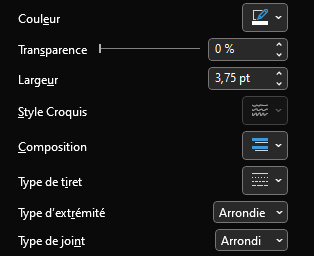.svg)
How to create arrows in PowerPoint?
Learn how to create different types of arrows in PowerPoint to highlight an idea or to guide the reader's attention.
Author
Dorian Floquet
Updated on
April 23, 2025
Created on
January 29, 2025
Category
Tutorials


Arrows have the ability to orient, structure, and energize your content. They are powerful elements for understanding a text, a diagram, a visual or a connector. Here are various types of arrows that can help you improve your PowerPoint presentation.
Solid Arrow
Solid Arrows Are most often used to direct the reader's gaze to an element to be highlighted or to facilitate reading comprehension. On PowerPoint, you have access to twenty arrows, all of which are Manually adjustable.
You will find them in “Insert” then “Shapes” in the upper banner.
To style your arrow, you must select it to reveal yellow circles that allow you to change the width of the bar and the length of the tip. You can change its color and add an outline if necessary as for any other shape. If your arrow needs to be brought closer to a shape, magnetism will allow you to identify the connection points.

Line Arrow
Unlike solid arrows, a Line Arrow is composed only of lines, generally of fine contours, giving it a minimalist and refined appearance. The line arrows that PowerPoint proposes offer more than Freedom of Design Whether for the shape of the lines or for the tips of the arrows.
Powerpoint offers various Cutting Edge Styles That you can change from”Shape format”. To access it, you must right click on your arrow and then click on “Shape Format”. A new panel will open that will allow you to modify both the tips and the path of your arrows.
The Tips
To style the tips of your arrow, click”Initial Arrow Type“If you want to change the tip on the left and on”Final Arrow Type“for the right. You will have the choice between 5 different tip styles.

You can also change the size of it from”Arrow Size”.

The line
From the sign”Shape format“, you can change the color, transparency, thickness, style, and edges of your line.

To style the line, click on”Dash type”. You have access to 8 different types of lines. We advise you to stick to the style”Uni“If the thickness of your line is light.

Importing an arrow into PowerPoint
PowerPoint gives us the tools to create simple and practical arrows but they don't always meet all needs. It is possible that you have to respect a graphic charter by using its arrow or that you want to use an arrow with a more technical construction or even simply integrate an arrow that you like. To do this, there are several ways to incorporate them into your presentation.
SVG Arrow
If you want to import an arrow into PowerPoint, the format SVG (Scalable Vector Graphics) is probably the best alternative. This format is fully editable in PowerPoint. This will allow you to adapt it according to the situation by changing its color, the thickness of the lines and other properties directly in the software. In addition, SVG guarantees a Optimal quality without loss of resolution. This is what we use as PowerPoint specialists.
Arrow in PNG format
If you are not comfortable with graphic tools, use the format PNG In PowerPoint. It is a simple format that allows you to quickly integrate ready-to-use arrows without the need for special technical knowledge. Make sure that your image is in good quality because PNG is a non-vector image format and will render less qualitative than SVG. In addition, you will not be able to change the color of this arrow easily.
Use an arrow in text
To clearly Structure your content, you can embed arrows as bullets in PowerPoint. This makes it possible to boost your PowerPoint visuals While highlighting the key points of your presentation. By replacing traditional bullet points with arrows, you can capture your reader's attention and improve the readability of your message.
To turn an arrow into bullets, all you need to do is:
- Select your text
- Click on Chip
- Click on Chip and Number
- Click on Image
- Click on From a file
- Import Your Arrow
Tip: Use arrows in SVG To change the color of these.





















